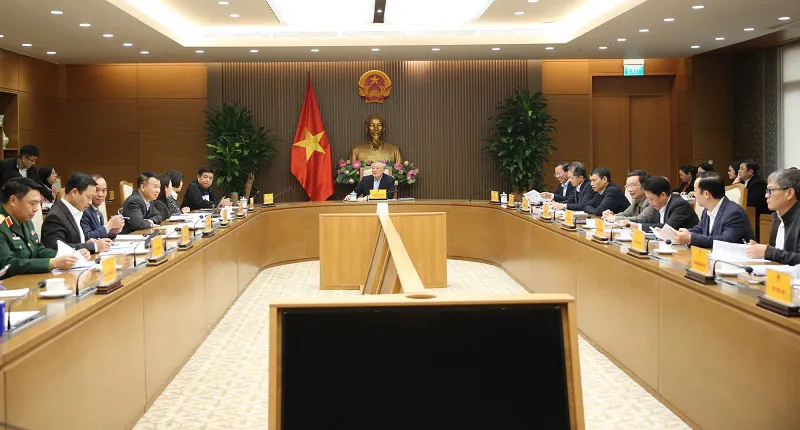Regional, international financial centers mean boosters to Vietnamese economy: Deputy PM
Ho Chi Minh City envisions its financial center encompassing the money market, banking system, capital market, and derivatives market.
The development of regional and international financial centers in Danang and Ho Chi Minh City will give Vietnam’s economy a big leap, said Deputy Prime Minister Nguyen Hoa Binh today (December 17).
| The meeting between Deputy Prime Minister Nguyen Hoa Binh and related parties on developing international financial centers in Danang and Ho Chi Minh City. Photo: baochinhphu.vn |
“This is one of the major political strategies for preparing our nation to enter a new era – an era of national resurgence – by creating mechanisms, resources, and momentum for economic growth,” he told a meeting on the development of the financial centers.
The Deputy Prime Minister asked ministries, government agencies, and local authorities of Ho Chi Minh City and Danang to find decisive and effective solutions to establish the two financial centers as soon as possible.
He also asked the Ministry of Planning and Investment to incorporate feedback from relevant ministries, government agencies, and localities into the project and related documents.
It is important for Vietnam to learn from the experiences of established financial hubs globally, Deputy Prime Minister Binh said.
He agreed with the ideas to establish an inter-agency steering committee to coordinate and ensure smooth, consistent operation of the financial centers.
Binh also approved the formation of two task forces in Ho Chi Minh City and Danang to oversee and lead the establishment and operation of the centers.
The Deputy Prime Minister called for developing institutional frameworks and policies tailored to financial centers, preparing the necessary resources to build infrastructure, and training a skilled workforce.
“We must have specific plans for domestic manpower development, sending local officials abroad for training. Furthermore, we need mechanisms to attract foreign talents,” he said. “We must have our staff ready and prepared once the financial centers become operational.”
He also urged ministries, government agencies, and local authorities to enhance communication efforts, promote investment, build social consensus, and advertise the centers to attract both domestic and international investors.
Minister of Planning and Investment Nguyen Chi Dung stressed that establishing regional and international financial centers in Vietnam is a novel and challenging mission.
“Ministries, government agencies, and localities have shown great initiative, determination, and effort in implementing this plan,” he said.
The development of financial centers requires a non-perfectionist but decisive and expeditious approach, coupled with innovative and exceptional policies, the minister said.
“We need policies that cater to what investors require, not just what we already have,” he said. “This involves consulting and engaging with stakeholders to understand their needs, enabling the creation of suitable and practical mechanisms.”
At the meeting, Deputy Minister of Planning and Investment Nguyen Thi Bich Ngoc reported that the ministry, relevant agencies, localities and partners have drafted an action plan for building regional and international financial centers in Vietnam and prepared related proposals.
The ministry has also studied international practices, and sought Vietnamese and international expertise to prepare for future implementation, she added.
Ho Chi Minh City People’s Committee Chairman Phan Van Mai and Danang Party Committee’s Secretary Nguyen Van Quang expressed strong support for the draft action plan to execute the Politburo’s conclusions on developing financial centers.
Both municipal leaders affirmed that their cities are well-prepared to establish regional and international financial centers. This includes careful policy formulation, identification of investment priorities in infrastructure, workforce development plans, and the organization of international study delegations.
According to a draft released in early 2022, Ho Chi Minh City envisions its financial center encompassing the money market, banking system, capital market, and derivatives market. The city’s roadmap outlines three phases of implementation, targeting completion by 2030.
To achieve this, the city aims to advance financial technologies (fintech), digital banking, and digital financial transactions. It also plans to transform Thu Thiem urban area into a financial-commercial and commodity-trading district.
For its part, Danang has allocated land resources and formulated special tax and infrastructure policies over the past decade to attract investors.












